- Clone
- 6A6 (See other available formats)
- Regulatory Status
- RUO
- Other Names
- BTLA, B and T lymphocyte attenuator
- Isotype
- Armenian Hamster IgG
- Ave. Rating
- Submit a Review
- Product Citations
- publications
CD272, also known as B and T lymphocyte attenuator (BTLA), is an Ig superfamily co-inhitory receptor with structural similarity to programmed cell death 1 (PD-1) and CTLA-4. BTLA is expressed on B cells, T cells, macrophages, dendritic cells, NKT cells, and NK cells. Engagement of BTLA by its ligand herpes virus entry mediator (HVEM) is critical for negatively regulating immune response. The absence of BTLA with HVEM inhibitory interactions leads to increased experimental autoimmune encephalomyelitis severity, enhanced rejection of partially mismatched allografts, an increased CD8+ memory T cell population, increased severity of colitis, and reduced effectiveness of T regulatory cells. BTLA plays an important role in the induction of peripheral tolerance of both CD4+ and CD8+ T cells in vivo. Tolerant T cells have significantly higher expression of BTLA compared with effectors and naïve T cells. BTLA may cooperate with CTLA-4 and PD-1 to control T cell tolerance and autoimmunity. It was reported that BTLA may regulate T cell function by binding to B7-H4, but further studies are needed to confirm. The existence of three distinct BTLA alleles has been reported.
Product DetailsProduct Details
- Verified Reactivity
- Mouse
- Antibody Type
- Monoclonal
- Host Species
- Armenian Hamster
- Immunogen
- C57BL/6 BTLA Ig domain protein in CFA
- Formulation
- 0.2 µm filtered in phosphate-buffered solution, pH 7.2, containing no preservative.
- Endotoxin Level
- Less than 0.01 EU/µg of the protein (< 0.001 ng/µg of the protein) as determined by the LAL test.
- Preparation
- The Ultra-LEAF™ (Low Endotoxin, Azide-Free) antibody was purified by affinity chromatography.
- Concentration
- The antibody is bottled at the concentration indicated on the vial, typically between 2 mg/mL and 3 mg/mL. Older lots may have also been bottled at 1 mg/mL. To obtain lot-specific concentration and expiration, please enter the lot number in our Certificate of Analysis online tool.
- Storage & Handling
- The antibody solution should be stored undiluted between 2°C and 8°C. This Ultra-LEAF™ solution contains no preservative; handle under aseptic conditions.
- Application
-
FC - Quality tested
IP - Reported in the literature, not verified in house - Recommended Usage
-
Each lot of this antibody is quality control tested by immunofluorescent staining with flow cytometric analysis. For flow cytometric staining, the suggested use of this reagent is ≤ 0.06 µg per million cells in 100 µL volume or 100 µL of whole blood. It is recommended that the reagent be titrated for optimal performance for each application.
- Application Notes
-
Additional reported applications (for relevant formats) include: immunoprecipitation1,2 and blocking3,5 of OT-I T cell responses in vitro and incidence of cerebral malaria in vivo caused by P. berghei ANKA (PbA) infection. The LEAF™ purified antibody (Endotoxin < 0.1 EU/µg, Azide-Free, 0.2 µm filtered) is recommended for functional assays (Cat. No. 139104). For highly sensitive assays, we recommend Ultra-LEAF™ purified antibody (Cat. No. 139117 - 139122) with a lower endotoxin limit than standard LEAF™ purified antibodies (Endotoxin < 0.01 EU/µg).
Clone 6A6 antibody reacts only with the C57BL/6 allele of BTLA but not the BALB/c allele of BTLA. -
Application References
(PubMed link indicates BioLegend citation) -
- Hurchla MA, et al. 2005. J. Immunol. 174:337. (IP FC)
- Sedy JR, et al. 2005. Nat. Immunol. 6:90. (IP)
- Lepenies B, et al. 2007. J. Immunol. 179:4093. (Block)
- Tao R, et al. 2005. J. Immunol. 175:5774. (FC)
- Albring J, et al. 2010. J. Exp. Med. 207:2551. (Block)
- RRID
-
AB_2860689 (BioLegend Cat. No. 139122)
AB_2832503 (BioLegend Cat. No. 139120)
AB_2832504 (BioLegend Cat. No. 139121)
AB_2832500 (BioLegend Cat. No. 139117)
AB_2832501 (BioLegend Cat. No. 139118)
AB_2832502 (BioLegend Cat. No. 139119)
Antigen Details
- Structure
- An Ig superfamily co-inhibitory receptor with structural similarity to programmed cell death 1 (PD-1) and CTLA-4.
- Distribution
-
BTLA is expressed on a wide number of lymphocytes in mice. It is most highly expressed on B cells, followed by CD4+ T cells, lower expression on CD8+ T cells, macrophages, dendritic cells, NKT cells, and NK cells.
- Function
- BTLA functions as a negative regulator of T cell activation and proliferation, attenuate B cell proliferation upon associating with its known ligand, herpes virus entry mediator (HVEM).
- Ligand/Receptor
- HVEM.
- Cell Type
- B cells, Dendritic cells, Lymphocytes, NKT cells, T cells
- Biology Area
- Immunology, Inhibitory Molecules
- Molecular Family
- CD Molecules
- Antigen References
-
1. Liu X, et al. 2009. J Immunol. 182:4516.
2. Miller ML, et al. 2009. J Immunol. 183:32.
3. Sun Y, et al. 2009. J Immunol. 183:1946.
4. Vendel AC, et al. 2009. J Immunol. 182:1509.
5. Watanabe N, et al. 2003. Nat Immunol. 4:670. - Gene ID
- 208154 View all products for this Gene ID
- UniProt
- View information about CD272 on UniProt.org
Related Pages & Pathways
Pages
Related FAQs
- Do you guarantee that your antibodies are totally pathogen free?
-
BioLegend does not test for pathogens in-house aside from the GoInVivo™ product line. However, upon request, this can be tested on a custom basis with an outside, independent laboratory.
- Does BioLegend test each Ultra-LEAF™ antibody by functional assay?
-
No, BioLegend does not test Ultra-LEAF™ antibodies by functional assays unless otherwise indicated. Due to the possible complexities and variations of uses of biofunctional antibodies in different assays and because of the large product portfolio, BioLegend does not currently perform functional assays as a routine QC for the antibodies. However, we do provide references in which the antibodies were used for functional assays and we do perform QC to verify the specificity and quality of the antibody based on our strict specification criteria.
- Does BioLegend test each Ultra-LEAF™ antibody for potential pathogens?
-
No, BioLegend does not test for pathogens in-house unless otherwise indicated. However, we can recommend an outside vendor to perform this testing as needed.
- Have you tested this Ultra-LEAF™ antibody for in vivo or in vitro applications?
-
We don't test our antibodies for in vivo or in vitro applications unless otherwise indicated. Depending on the product, the TDS may describe literature supporting usage of a particular product for bioassay. It may be best to further consult the literature to find clone specific information.
Other Formats
View All CD272 Reagents Request Custom Conjugation| Description | Clone | Applications |
|---|---|---|
| Alexa Fluor® 647 anti-mouse CD272 (BTLA) | 6A6 | FC |
| PE anti-mouse CD272 (BTLA) | 6A6 | FC |
| APC anti-mouse CD272 (BTLA) | 6A6 | FC |
| TotalSeq™-A0881 anti-mouse CD272 (BTLA) | 6A6 | PG |
| PE/Cyanine7 anti-mouse CD272 (BTLA) | 6A6 | FC |
| Ultra-LEAF™ Purified anti-mouse CD272 (BTLA) | 6A6 | FC,IP |
| TotalSeq™-C0881 anti-mouse CD272 (BTLA) | 6A6 | PG |
| PE/Fire™ 640 anti-mouse CD272 (BTLA) | 6A6 | FC |
| PE/Fire™ 700 anti-mouse CD272 (BTLA) | 6A6 | FC |
| TotalSeq™-B0881 anti-mouse CD272 (BTLA) | 6A6 | PG |
Compare Data Across All Formats
This data display is provided for general comparisons between formats.
Your actual data may vary due to variations in samples, target cells, instruments and their settings, staining conditions, and other factors.
If you need assistance with selecting the best format contact our expert technical support team.
-
Alexa Fluor® 647 anti-mouse CD272 (BTLA)
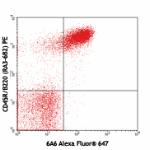
C57BL/6 splenocytes stained with CD45R/B220 (RA3-6B2) PE and... -
PE anti-mouse CD272 (BTLA)
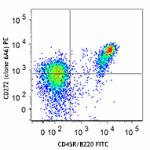
C57BL/6 mouse splenocytes were stained with CD45R/B220 FITC ... 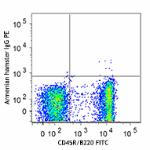
-
APC anti-mouse CD272 (BTLA)
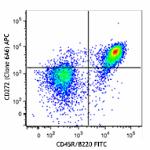
C57BL/6 mouse splenocytes were stained with CD45R/B220 FITC ... 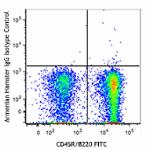
-
TotalSeq™-A0881 anti-mouse CD272 (BTLA)
-
PE/Cyanine7 anti-mouse CD272 (BTLA)

C57BL/6 mouse splenocytes were stained with CD45R/B220 FITC ... -
Ultra-LEAF™ Purified anti-mouse CD272 (BTLA)
-
TotalSeq™-C0881 anti-mouse CD272 (BTLA)
-
PE/Fire™ 640 anti-mouse CD272 (BTLA)

C57BL/6 mouse splenocytes were stained with anti-mouse CD45R... -
PE/Fire™ 700 anti-mouse CD272 (BTLA)

C57BL/6 mouse splenocytes were stained with anti-mouse/human... -
TotalSeq™-B0881 anti-mouse CD272 (BTLA)
 Login / Register
Login / Register 









Follow Us